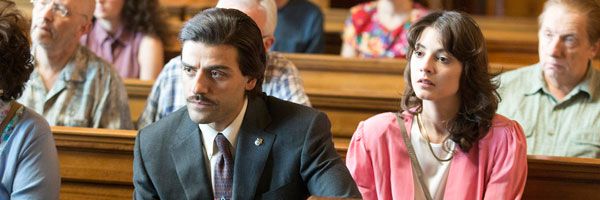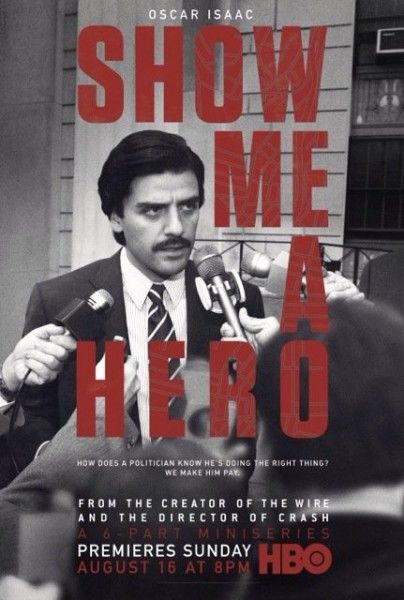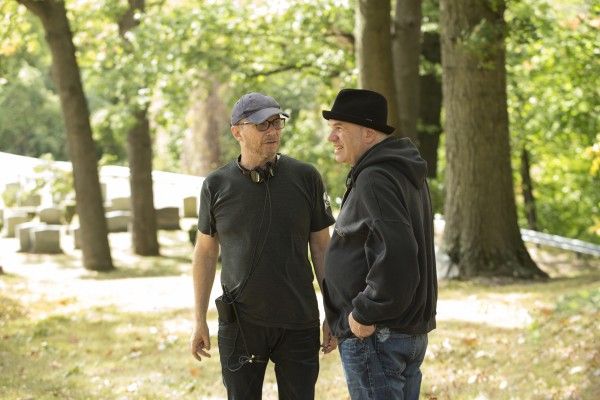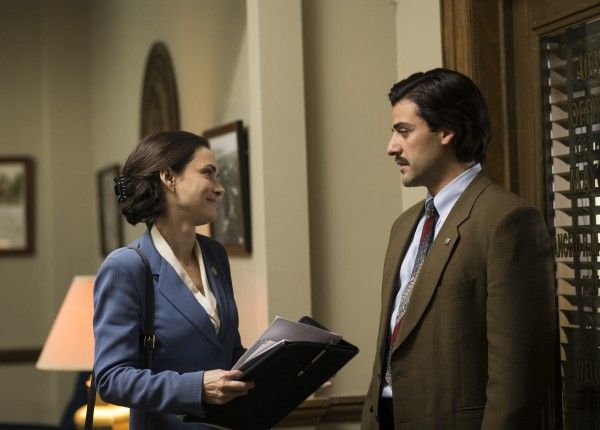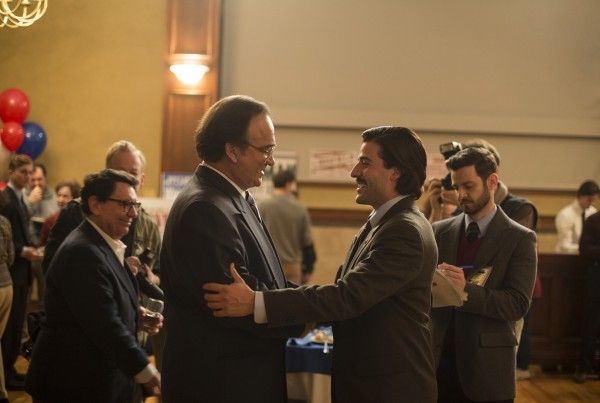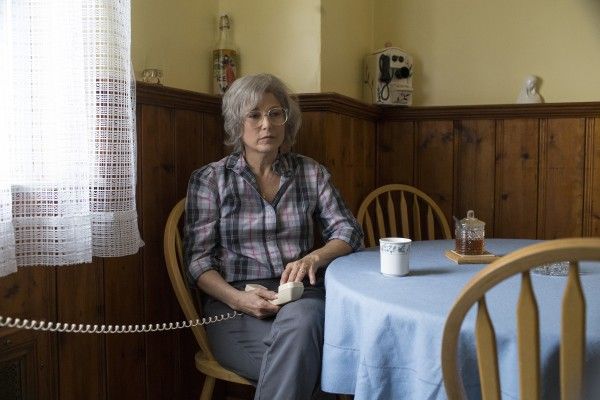From David Simon (Treme, The Wire), William F. Zorzi Jr. and Paul Haggis (Crash), the six-hour HBO mini-series Show Me A Hero, set in the late 1980s, follows the young mayor (Oscar Isaac) of a mid-sized American city, who is faced with a federal court order that says he must build a small number of low-income housing units in the white neighborhoods of his town. His attempt to do so tears the entire city apart, paralyzes the municipal government and, ultimately, destroys the mayor and his political future.
While at the HBO portion of the TCA Press Tour, executive producers David Simon and William F. Zorzi Jr. spoke to Collider for this exclusive interview about tackling such tough subject matter, what made them spend so many years working on telling this story, the challenges of telling a story with so much dialogue and conversation, what makes HBO such great collaborators, and having such a terrific cast to work with.
Collider: This is a tough subject matter that takes a bit of time to get into. Do you worry about audiences tuning in and sticking with it?
DAVID SIMON: I think we will lose people on the subject matter alone, but we’ll gain people on Oscar Isaac and the rest of the cast. It’s a very strong cast. It’s not a period piece. It is a period piece, but it just keeps going on, over and over. It’s going on right now, two towns north of Yonkers in Tarrytown, in the same county with the same rhetoric and same demagoging. They’re fighting court-ordered integration, as if these issues haven’t already been decided, all the way up to the Supreme Court. The 20-year hell that Yonkers went through means absolutely nothing, two jurisdictions over, right this moment.
Bill, what was it about this subject that made you want to spend so many years working on telling this story?
WILLIAM ZORZI: I didn’t think it was going to be that many years. I was working on the desk at the Baltimore Sun as an editor, and there were a lot of young reporters around me. David called me on deadline. He had forgotten what it was like to be on deadline because he had left the paper to go into TV. He said, “You need to read this book,” and I was like, “Yeah, okay.” Two weeks later, he called back and said, “Did you read that book?” I was like, “What’s the name of that book again?” I thought we were go right into it, but little did I know.
SIMON: He started the process of augmenting the book. He went up to Yonkers and met all of these people, so that we could not only have the narrative of the book that we understood, but all the pieces in between. You’ve gotta have people say words to each other, and for good prose journalism, you need to have more in your tool bag. You need to meet people and hear their voice and hear how they talk. So, if they were alive 14 years ago, Bill met them. With only a handful of exceptions, everybody talked to him.
ZORZI: There were a couple of exceptions, but everybody talked to me. They’re all dead now.
SIMON: If they’re still alive, they still talk to him. When he walks down the street in Yonkers, they act like he’s from there. It’s creepy. Not everybody is going to be happy with everything. But having worked with Bill for a number of years, he would be able to look them in the eye, and they would answer the phone or come to the door for him.
Is it challenging to tell a story like this, where there is so much conversation and dialogue, and no big action?
ZORZI: It’s not just a lot of conversation, it’s a lot of city council meetings and technical things. I hate to blow smoke up HBO’s ass, but it is a testament to them, collectively, that they were willing to stick this out. I think they’re the only entity on earth that would be willing to make a six-hour mini-series about public housing desegregation, with the backstory being political.
SIMON: It almost suggests that they don’t know what they’re doing, or they just don’t give a good god damn. My weirdness, in terms of wanting to do stories like this, became part of their brand. Maybe it’s not the most effective part of their brand, but it became part of their brand. This got bumped a few times, in terms of our development, because The Wire happened. And then, it was going to be the next mini-series, but Generation Kill needed to go next because it was time pegged to the invasion of Iraq. And then, Treme was linked to Katrina. But. I think it was three times that we renewed the book option while the scripts were slowly coming together. We agreed that race wasn’t going to go away, as a dynamic. The racial mythology of this country was not going to go away, anytime soon, and this piece was going to be timely, whenever it landed. I’m joking because the truth is that there was a lot of thought to keeping the project alive, maintaining it and delivering it, finally. Those guys are crazy. They have to greenlight stuff, and not everything gets a green light, but this did. There were other things on my list that they said no to, and they said, “It’s time. Let’s do this one.”
What is it about HBO, as collaborators, that keeps you coming back to them, as opposed to going somewhere else?
SIMON: Well, it’s a very gentle leash compared to other networks, and I say that only having worked as a junior producer at NBC with Homicide, when I was learning this stuff from Tom Fontana. I got to watch Tom have to operate at a network. Even at a benign network with a show as good as Homicide, the network notes were much more commercial, in terms of what might be popular and what might be unpopular being utterly disconnected from the purpose of the story. The famous joke we used to tell was based on an actual conversation that, at some point, some Vice President at NBC said to Tom, “But where are the victories?,” after reading a few of the scripts. And Tom leaned forward and put his hand gently on the man’s shoulder and said, “The show is called Homicide.” What he was saying, basically, was, “Can we get some redemption before the last half-hour?” Between the comic book characters and the action and the most over-sold thing in American TV, which is redemption, there’s not a lot of room left to argue about adult shit. And HBO is not particularly afraid of adult shit. I have to say, sometimes the notes are really valuable, in terms of, “We didn’t understand this,” or “You have too much of this,” or “This feels a little bit over the top.” The notes never come back and say, “Can we do a story about something that is more gratifying?,” or “Can somebody win at the end? Where are the victories?”
This story has a slightly hopeful note at the end, but things didn’t turn out great for everyone involved.
SIMON: No, and remember that’s 200 units. This whole fight, which went on until 2007, if you include affordable housing and school desegregation, and all of the elements of the federal case, had all of these casualties and all of this waste, and here they are, sitting on a porch of one of 200 units built in a city of 200,000 people. Imagine how wracked American society would be, if we were really trying to change things systemically, in terms of the poor, class and race in this country. This was the fight it took to build 200 units in this one city. You get to the end and you’re happy for Mary and you’re happy for Doreen, but I’m hoping people will at least pause and think about how exhausting it was just to do that, and what the cost was.
How did you put this terrific cast together? Did you think of any of these actors while you were writing these roles?
ZORZI: I wasn’t thinking of anyone while I was writing it.
SIMON: During the writing, we were just trying to think of real characters. Afterwards, we started thinking of real people and made lists, not thinking we could get them. When Oscar Isaac signed on, given the year he’s had and given the opportunities he has, that he chose this, I’d like to think that we acquired a little bit of gravitas with a lot of actors and their agents, and the scripts became a little more interesting to people. The possibilities may have expanded, in some people’s minds. But I’m really enamored of the actors, who have the opportunity to do much more dramatic and better paying things, and how they jumped on this, with an ensemble feel to the show. When you turn this way, it’s Alfred Molina inhabiting Hank Spallone. When you turn that way, it’s Winona Ryder just being Vinni Restiano. It was an embarrassment of riches. There was a point when Winona Ryder showed up in the hair trailer and she was arguing for a wig and for really doing everything possible, for the purpose of this role, to obliterate previous Winona iconography to be Vinni Restiano. And she wasn’t coming out of that hair trailer until she had convinced us of what we needed to do to help her get there. I was very enamored of everybody’s professionalism on this show. I go through periods where I think that, if we could just get rid of the actors, this would be a gorgeous way to make a living. This show was not one of those times. This show reaffirmed my belief in their craft. They were generous with each other and realized that the whole universe had to be filled with people that are credible, in every direction.
ZORZI: They worked hard. They didn’t just mail it in. They researched and they asked good questions, which is not always the case with actors.
SIMON: There was none of that shit of, “I need more lines.” It was asking questions about, who was Hank Spallone and what would he think about this? Everybody was trying to chase the real. It was pretty admirable.
Show Me A Hero airs on Sunday nights on HBO, on August 16th, 23rd and 30th.

